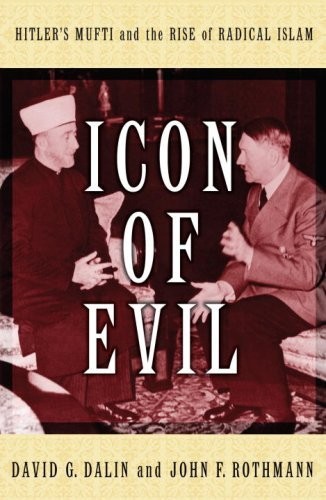
Icon of Evil
Hitler's Mufti and the Rise of Radical Islam
کتاب های مرتبط
- اطلاعات
- نقد و بررسی
- دیدگاه کاربران
نقد و بررسی

April 28, 2008
Middle East scholars Dalin (The Myth of Hitler's Pope
) and Rothmann collaborate in this harrowing account of Haj Amin al-Husseini, the British-appointed Mufti of Jerusalem and the political and spiritual head of the Palestinian Arab community from the 1920s on, who helped seal a powerful bond between Islamic radicals and Nazi officials. A longtime admirer of National Socialism and personal friend of Himmler and Eichmann, al-Husseini championed the Final Solution, made propaganda broadcasts to the Middle East, encouraged Muslim participation in the Waffen SS and called for exterminating Palestine's Jewish population. His advocacy of a holy war against Jews and their British supporters culminated in the massive Arab Revolt of 1937. Escaping to Egypt as the Third Reich collapsed, al-Husseini found his hopes for an “All-Palestine government” frustrated; however, the Islamization of anti-Semitism proved to be his enduring legacy—he imported and localized Nazi slogans and counted among his acolytes his cousin, the young Yasser Arafat. The authors draw persuasive links between al-Husseini and current contemporary events—notably the execution of journalist Daniel Pearl—giving this history a haunting relevance.

June 15, 2008
Coauthors Dalin (research fellow, American history, Hoover Inst., Stanford Univ.; "The Myth of Hitler's Pope") and Rothmann (Fromm Inst. for Lifelong Learning, Univ. of San Francisco) shed light on the "fuehrer of the Arab world," Haj Amin al-Husseini, and his legacy of anti-Semitism in the Middle East. Appointed Grand Mufti of Jerusalem by the British in 1922, al-Husseini was by 1933 making overtures to Adolf Hitler to enlist German help in eliminating Jewish settlements in Palestine. He enjoyed a cozy relationship with Hitler, Heinrich Himmler, and other Nazi leaders. During the war he helped recruit Bosnian Muslims for Germany's Waffen SS. It is alleged, though the authors acknowledge that it is not proven, that al-Husseini was influential in the decision to implement the Final Solution. The mufti escaped indictment at Nuremburg and fled to Egypt despite being named a war criminal by the UN in 1945, eventually dying in Beirut in 1974. The authors have used a variety of primary sources, tracing al-Husseini from his beginnings, through Nazi Germany, and up to consideration of his impact on radical Islam today. The book is brief, but readers seeking other sources for further in-depth analysis of al-Husseini will not find much else available. Recommended.Patti C. McCall, AMRI Albany, NY
Copyright 2008 Library Journal, LLC Used with permission.

June 1, 2008
In the last century, Arab peoples have frequently fared poorly under leaders chosen by or foisted upon them, including Egypts Nasser, Syrias Assad, and Iraqs Hussein. Among the most destructive of these was Haj Amin al-Husseini, who dominated Palestinian politics for several critical decades of the twentieth century. This account of the life and career of al-Husseini is interesting and disturbing but hardly balanced. If the authorsgoalis to show the venality of their subject and the tragic consequences for Palestinians, they succeed admirably. As Grand Mufti of Jerusalem, al-Husseini maintained his personal and family powers like a gangster. His nationalist aspirations manifested themselves in the form of rabid Jew baiting that went far beyond opposition to Zionism, and the authors conclusively show how he promoted the extermination of Jews while he resided in Hitlers Germany. However, their effort to link al-Husseini to the rise of contemporary radical Islam isunconvincing. Still, this is a useful work that helps explain the sad legacy of Palestinian political life.(Reprinted with permission of Booklist, copyright 2008, American Library Association.)

























دیدگاه کاربران